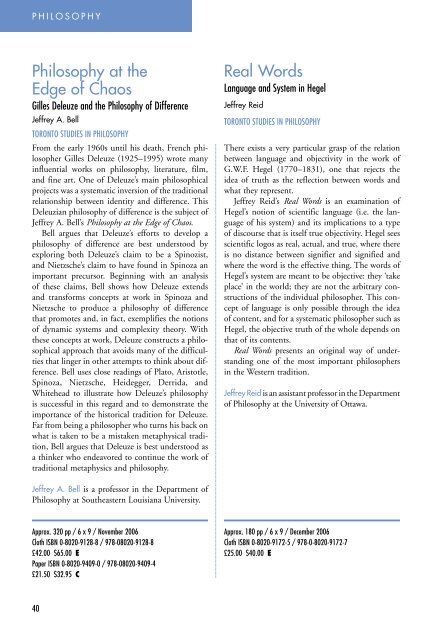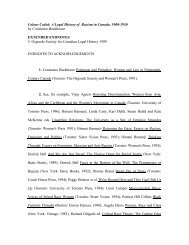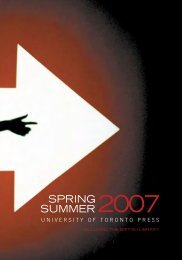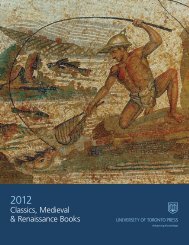Fall/Winter 2006 - University of Toronto Press Publishing
Fall/Winter 2006 - University of Toronto Press Publishing
Fall/Winter 2006 - University of Toronto Press Publishing
You also want an ePaper? Increase the reach of your titles
YUMPU automatically turns print PDFs into web optimized ePapers that Google loves.
P H I L O S O P H Y<br />
Philosophy at the<br />
Edge <strong>of</strong> Chaos<br />
Gilles Deleuze and the Philosophy <strong>of</strong> Difference<br />
Jeffrey A. Bell<br />
TORONTO STUDIES IN PHILOSOPHY<br />
From the early 1960s until his death, French philosopher<br />
Gilles Deleuze (1925–1995) wrote many<br />
influential works on philosophy, literature, film,<br />
and fine art. One <strong>of</strong> Deleuze’s main philosophical<br />
projects was a systematic inversion <strong>of</strong> the traditional<br />
relationship between identity and difference. This<br />
Deleuzian philosophy <strong>of</strong> difference is the subject <strong>of</strong><br />
Jeffrey A. Bell’s Philosophy at the Edge <strong>of</strong> Chaos.<br />
Bell argues that Deleuze’s efforts to develop a<br />
philosophy <strong>of</strong> difference are best understood by<br />
exploring both Deleuze’s claim to be a Spinozist,<br />
and Nietzsche’s claim to have found in Spinoza an<br />
important precursor. Beginning with an analysis<br />
<strong>of</strong> these claims, Bell shows how Deleuze extends<br />
and transforms concepts at work in Spinoza and<br />
Nietzsche to produce a philosophy <strong>of</strong> difference<br />
that promotes and, in fact, exemplifies the notions<br />
<strong>of</strong> dynamic systems and complexity theory. With<br />
these concepts at work, Deleuze constructs a philosophical<br />
approach that avoids many <strong>of</strong> the difficulties<br />
that linger in other attempts to think about difference.<br />
Bell uses close readings <strong>of</strong> Plato, Aristotle,<br />
Spinoza, Nietzsche, Heidegger, Derrida, and<br />
Whitehead to illustrate how Deleuze’s philosophy<br />
is successful in this regard and to demonstrate the<br />
importance <strong>of</strong> the historical tradition for Deleuze.<br />
Far from being a philosopher who turns his back on<br />
what is taken to be a mistaken metaphysical tradition,<br />
Bell argues that Deleuze is best understood as<br />
a thinker who endeavored to continue the work <strong>of</strong><br />
traditional metaphysics and philosophy.<br />
Real Words<br />
Language and System in Hegel<br />
Jeffrey Reid<br />
TORONTO STUDIES IN PHILOSOPHY<br />
There exists a very particular grasp <strong>of</strong> the relation<br />
between language and objectivity in the work <strong>of</strong><br />
G.W.F. Hegel (1770–1831), one that rejects the<br />
idea <strong>of</strong> truth as the reflection between words and<br />
what they represent.<br />
Jeffrey Reid’s Real Words is an examination <strong>of</strong><br />
Hegel’s notion <strong>of</strong> scientific language (i.e. the language<br />
<strong>of</strong> his system) and its implications to a type<br />
<strong>of</strong> discourse that is itself true objectivity. Hegel sees<br />
scientific logos as real, actual, and true, where there<br />
is no distance between signifier and signified and<br />
where the word is the effective thing. The words <strong>of</strong><br />
Hegel’s system are meant to be objective: they ‘take<br />
place’ in the world; they are not the arbitrary constructions<br />
<strong>of</strong> the individual philosopher. This concept<br />
<strong>of</strong> language is only possible through the idea<br />
<strong>of</strong> content, and for a systematic philosopher such as<br />
Hegel, the objective truth <strong>of</strong> the whole depends on<br />
that <strong>of</strong> its contents.<br />
Real Words presents an original way <strong>of</strong> understanding<br />
one <strong>of</strong> the most important philosophers<br />
in the Western tradition.<br />
Jeffrey Reid is an assistant pr<strong>of</strong>essor in the Department<br />
<strong>of</strong> Philosophy at the <strong>University</strong> <strong>of</strong> Ottawa.<br />
Jeffrey A. Bell is a pr<strong>of</strong>essor in the Department <strong>of</strong><br />
Philosophy at Southeastern Louisiana <strong>University</strong>.<br />
Approx. 320 pp / 6 x 9 / November <strong>2006</strong><br />
Cloth ISBN 0-8020-9128-8 / 978-08020-9128-8<br />
£42.00 $65.00 E<br />
Paper ISBN 0-8020-9409-0 / 978-08020-9409-4<br />
£21.50 $32.95 C<br />
Approx. 180 pp / 6 x 9 / December <strong>2006</strong><br />
Cloth ISBN 0-8020-9172-5 / 978-0-8020-9172-7<br />
£25.00 $40.00 E<br />
40
















